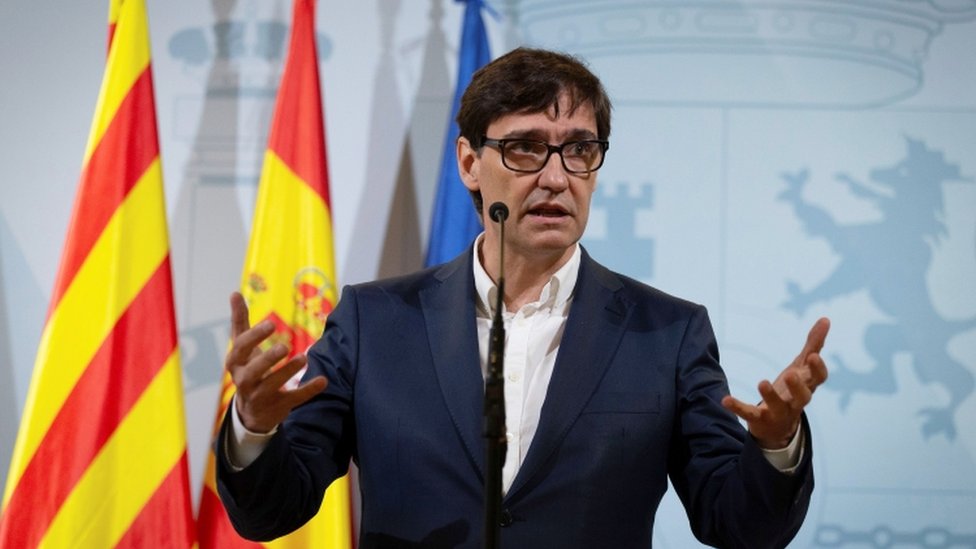-
Coronavirus pandemic

image copyrightEPA
The Spanish government has urged authorities in Madrid to tighten coronavirus restrictions across the city, warning of a “serious risk” to residents if they do not.
Madrid extended restrictions in Covid-19 hotspots on Friday but rejected calls for a city-wide lockdown.
On Saturday Spain’s Health Minister Salvador Illa said current restrictions did not go far enough.
He said it was “time to act with determination” to control the pandemic.
“There is a serious risk for inhabitants, for the neighbouring regions,” Mr Illa said, calling on the capital’s regional authorities to “put the health of citizens first” and impose a partial lockdown on the entire city.
Spain’s regions are in charge of healthcare and so the central government does not have the power to impose the restrictions it prefers.
Madrid is again at the epicentre of Spain’s coronavirus outbreak, as it was during the first peak earlier this year. The country recorded a further 12,272 cases on Friday, bringing the official total to 716,481, the highest infection tally in western Europe.
Spain and many other countries in the northern hemisphere have seen a second wave of the coronavirus pandemic in recent weeks.
The World Health Organization (WHO) has issued a stark warning about the resurgence of the virus in Europe and elsewhere as winter approaches.
European countries were seeing “worrying increases of the disease”, with “a small uptick in deaths in older people” that will inevitably increase, Dr Mike Ryan, head of the WHO’s emergencies team, said on Friday.
Dr Ryan questioned whether European countries had “really exhausted all the tools” at their disposal to prevent a second round of national lockdowns.
“Lockdowns are almost a last resort – and to think that we’re back in last-resort territory in September, that’s a pretty sobering thought,” Dr Ryan told reporters at the WHO’s headquarters in Geneva.
- Poland, Russia and the Czech Republic have all reported sharp rises in new cases, mirroring the trend seen across Europe
- Another 14,412 new coronavirus infections were recorded in France on Saturday, almost as many as the country’s daily record of 16,096 set earlier this week
- Plans to close all bars and restaurants in the southern French city of Marseille have been pushed back until Sunday evening, after protests
- Dutch Prime Minister Mark Rutte has issued a particularly gloomy warning about a second wave in the Netherlands, saying the “figures look downright terrible”
- In the UK, police said they were shutting down a protest against coronavirus restrictions in London’s Trafalgar Square because crowds had “not complied” with social distancing rules
How bad is the situation in Madrid?
The Madrid region accounts for about a third of all Spain’s cases and deaths. In recent weeks, coronavirus cases have been rising sharply, putting pressure on the health system as hospital admissions increase.
With the situation worsening, the Spanish government and regional authorities in Madrid disagree on what action is required.
Madrid’s regional government has chosen not to put the entire city and the surrounding areas under lockdown, but on Friday said it would extend restrictions on movement to another eight districts, affecting about a million people.
Restrictions have now been imposed on 45 areas in some of Madrid’s poorer districts, leaving residents there feeling abandoned, stigmatised and worried about the loss of income, Reuters news agency reports.
From Monday, residents in these areas will only be able to leave their zone to go to work, school or to seek medical care. Social gatherings within each zone will be limited to six, public parks will be shut and commercial businesses will need to close by 22:00.
However, the Spanish government has argued that these restrictions are not sufficient, recommending an end to all unnecessary movement across the city, among other measures.
Mr Illa called on regional officials to put political considerations aside and act on the science.
“I want to repeat the call for the measures [in Madrid] to be reviewed, to listen to the science. To leave politics in the background. To put the health of citizens first,” Mr Illa said.
You might also be interested in:




